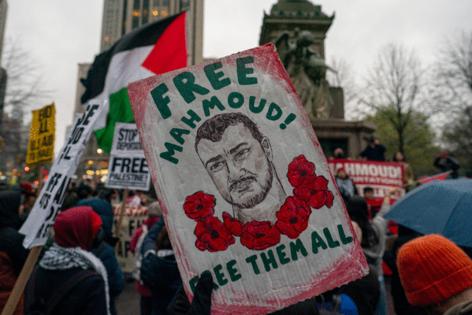Commentary: Quiet death of dissent
Published in Op Eds
There is something particularly American about the way we're dismantling our democracy these days – we are doing it with paperwork. While the world watches our grand political theater, immigration agents are quietly canceling visas, filling out deportation orders, and reshaping the boundaries of acceptable speech without firing a single shot.
I think about Mahmoud Khalil, a Palestinian activist and Columbia graduate who committed no crime beyond speaking his mind. I think about Rumeysa Ozturk, a doctoral student at Tufts whose academic career hangs by a thread. I think about the estimated 300 international students whose visas are under review or already revoked for daring to participate in First Amendment exercises on campus across the United States. These stories are not just about immigration status but about who is American enough to participate in its democracy and under what conditions.
We are experiencing the weaponization of the First Amendment. It's a familiar pattern to those of us who study American history. When direct censorship becomes too apparent, too constitutionally questionable, the state machinery finds other ways to silence dissenting voices.
During the Red Scare, it was deportation orders against immigrant labor organizers. During the Civil Rights Movement, local ordinances were selectively enforced against protesters. Now, it's the calculated use of immigration law to chill political speech.
The genius of our government's approach – and I use that word with all the bitterness it deserves – is its apparent neutrality. Federal authorities assure us no one is being arrested for their speech. These are simply routine immigration matters.
But there's nothing routine about the pattern emerging before our eyes: speak too loudly about specific issues, challenge the wrong policies, and suddenly, your paperwork receives extra scrutiny. One's visa status becomes questionable. Another's right to remain in a country you've made your home becomes uncertain.
Happening now is a test of our democratic character. When we allow the government to use administrative procedures to silence voices it doesn't want to hear, we're not just failing those directly affected. We're failing the very principle of free speech that we claim makes America exceptional.
The fundamental irony should not escape us that many of these deportation threats target students and scholars at leading universities. Institutions that we proudly claim as bastions of free inquiry and open debate. When we invite bright minds to our shores, we send conflicted messages worldwide, only to expel them when they engage in the democratic practices we claim to champion.
We must fully accept that the state of our democratic republic and its values are seriously in question. Free speech only truly applies to citizens. Citizens who speak in ways that don't challenge power, especially Whiteness, too directly. When did we decide the First Amendment was too dangerous to extend to everyone within our borders?
Likewise, strategic silencing of targeted individuals, people groups, or ideologies is not about national security. On the contrary, silencing is about creating an atmosphere of fear that makes others think twice before speaking up. Every visa revocation and every deportation threat sends a message to countless others: your presence here is conditional on your silence.
James Baldwin, whose words I often return to in times like these, reminded us that America is peculiarly and uniquely situated to contribute significantly to the world. "But she can only do this if she is willing to re-examine herself and learn what it means to be Black in America." We should note that America can only contribute if it is willing to re-examine what it means to be a democracy in practice, not just in theory.
Deportation is not simply about the exiting of individuals who illegally reside within our borders — deportation, as purposed by this current administration, is toward extinguishing ideas and identities. Truthfully, revoking visas is best described as an act of retribution.
Every use of administrative violence to silence dissent moves further from the democratic ideals we claim and closer to fascist rule. Will we be a nation that genuinely embraces the messy, uncomfortable work of democratic discourse? Or will we continue to rely on bureaucratic machinery to ensure that only certain voices are heard?
Unfortunately, political speeches or Supreme Court decisions will not assure our destiny. How we respond to these quieter attacks on democratic expression will speak volumes. Whether we're willing to stand up for the principle that the First Amendment isn't just a protection for citizens' speech or a fundamental and protected human right for all who live under our laws. Every time we allow the government to use deportation as a tool of political silencing, we're not just failing those directly affected – we're participating in the quiet death of American democracy itself.
____
Rev. Dr. F. Willis Johnson is a spiritual entrepreneur, author, scholar-practioner whose leadership and strategies around social and racial justice issues are nationally recognized and applied.
_____
©2025 The Fulcrum. Visit at thefulcrum.us. Distributed by Tribune Content Agency, LLC.




























































Comments